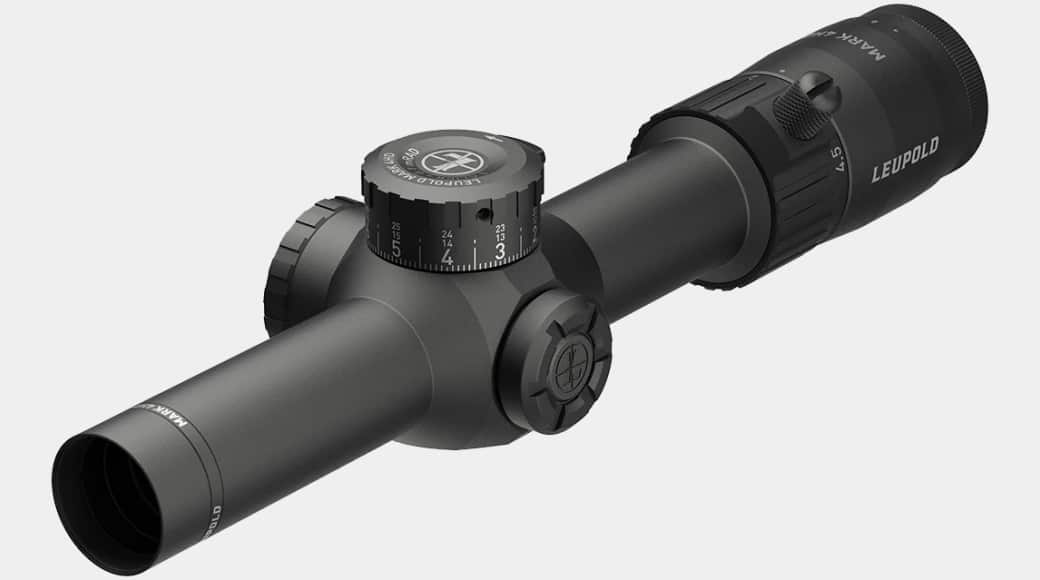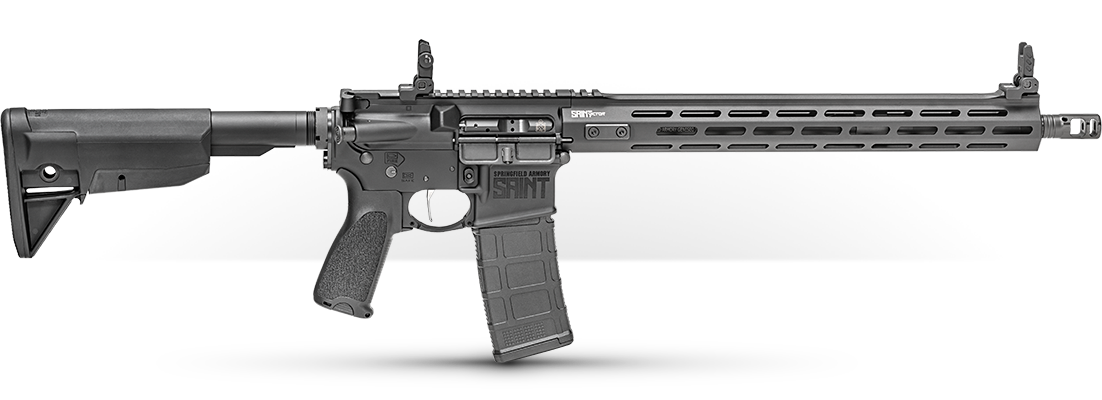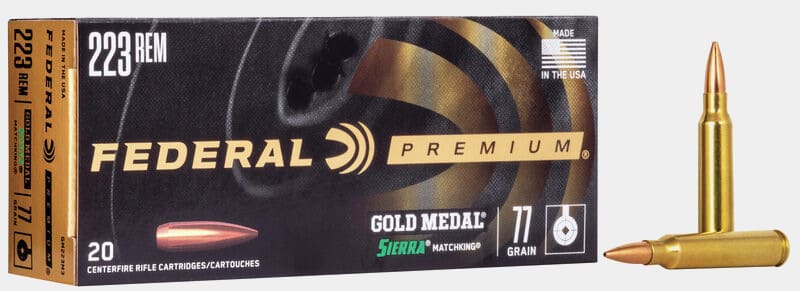In today’s article, Joe Kurtenbach reviews the Leupold Mark 4HD 1-4.5x24mm scope. This LPVO rifle scope is the lowest magnification option in the refreshed Mark 4HD line. Kurtenbach gets this optic on the range for a full evaluation of its capabilities. The Mark 4HD scope was provided on loan to the author for this review.
Leupold earned its position atop the sporting optic industry. The company does it all. Among U.S.-based riflescope manufacturers, Leupold’s catalog is impressive for its length and breadth. Seemingly offering a tailor-made optic for every ballistic pursuit, the company is renowned for the consistent quality, performance, and durability of its products.
One of the latest feathers in the company’s cap is the Mark 4HD 1-4.5x24mm riflescope, the smallest member of the recently updated Mark 4 series. In Leupold’s lexicon, the “Mark” moniker denotes optics designed to meet the needs of military and law enforcement users. Durable aluminum construction, robust controls, and reliable precision have helped these tactical riflescopes earn an enviable reputation among armed professionals.
As proof of Leupold’s esteem, when the United States Special Operations Command had specific requirements for hard-use glass, they worked with Leupold to develop the Mark 6 and Mark 8 riflescopes. Since then, the company applied its expertise in battle-proven precision to launch the Mark 5HD series of scopes which introduced Leupold’s Professional-Grade Optical System for improved light transmission and clarity.
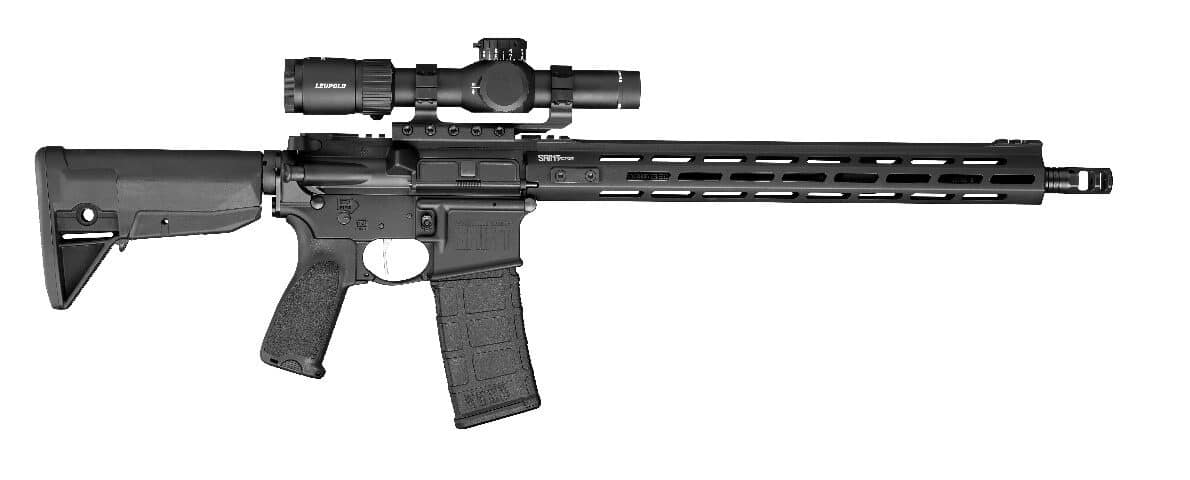
The products also featured a wide range of windage and elevation adjustment, improved controls, and a selection of purpose-driven first focal plane (FFP) and second focal plane (SFP) reticles.
[For additional information on reticles, read our article First Focal Plane vs. Second Focal Plane.]
New for 2024 is the Mark 4HD series, including the 1-4.5×24. These scopes are distinct for their 4X magnification ratio, but still carry over the best features of the Mark 5HD line at a more accessible price point.
[Editor’s note: We’ve previously reviewed the Leupold Mark 5HD 2-10x scope and the Leupold Mark 5HD 3.6-18x scope.]
The Leupold Mark 4HD Series
At writing, the Mark 4HD family includes five primary scope configurations and a total of 17 models differentiated by size, magnification and reticle design. The big boys in the family are built on 34mm main tubes and come in 8-32x56mm, 6-24x52mm, and 4.5-18x52mm configurations. At the smaller end of the spectrum, Leupold also included 2.5-10x42mm and 1-4.5x24mm options in the series, built on 30mm main tubes.
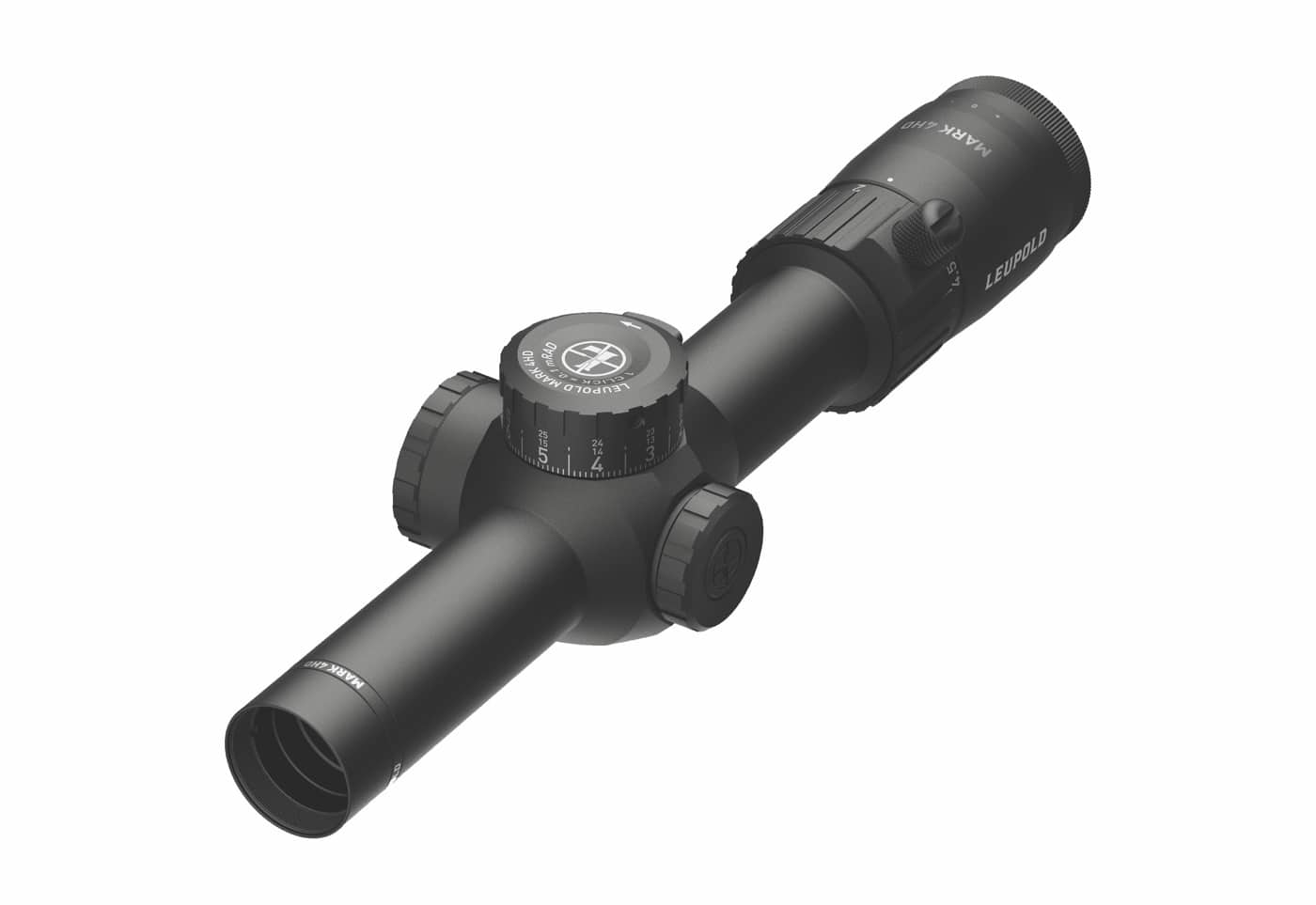
Not everyone reading this will be hip to sporting-optic vernacular, so let me break down these designations using the 1-4.5x24mm scope as the example. The first component, 1-4.5, is the magnification range. The lowest power setting on the riflescope is 1X magnification — or no optical zoom — and it can be dialed up to 4.5X.
The next number, 24mm, is the size of the front or objective lens. For this scope, the objective lens is quite small, eschewing the typical bell shape of larger optics. Generally, the size of the objective increases along with high-end magnification ratings because a larger forward-facing lens is needed to effectively gather light and take in the view at longer ranges.
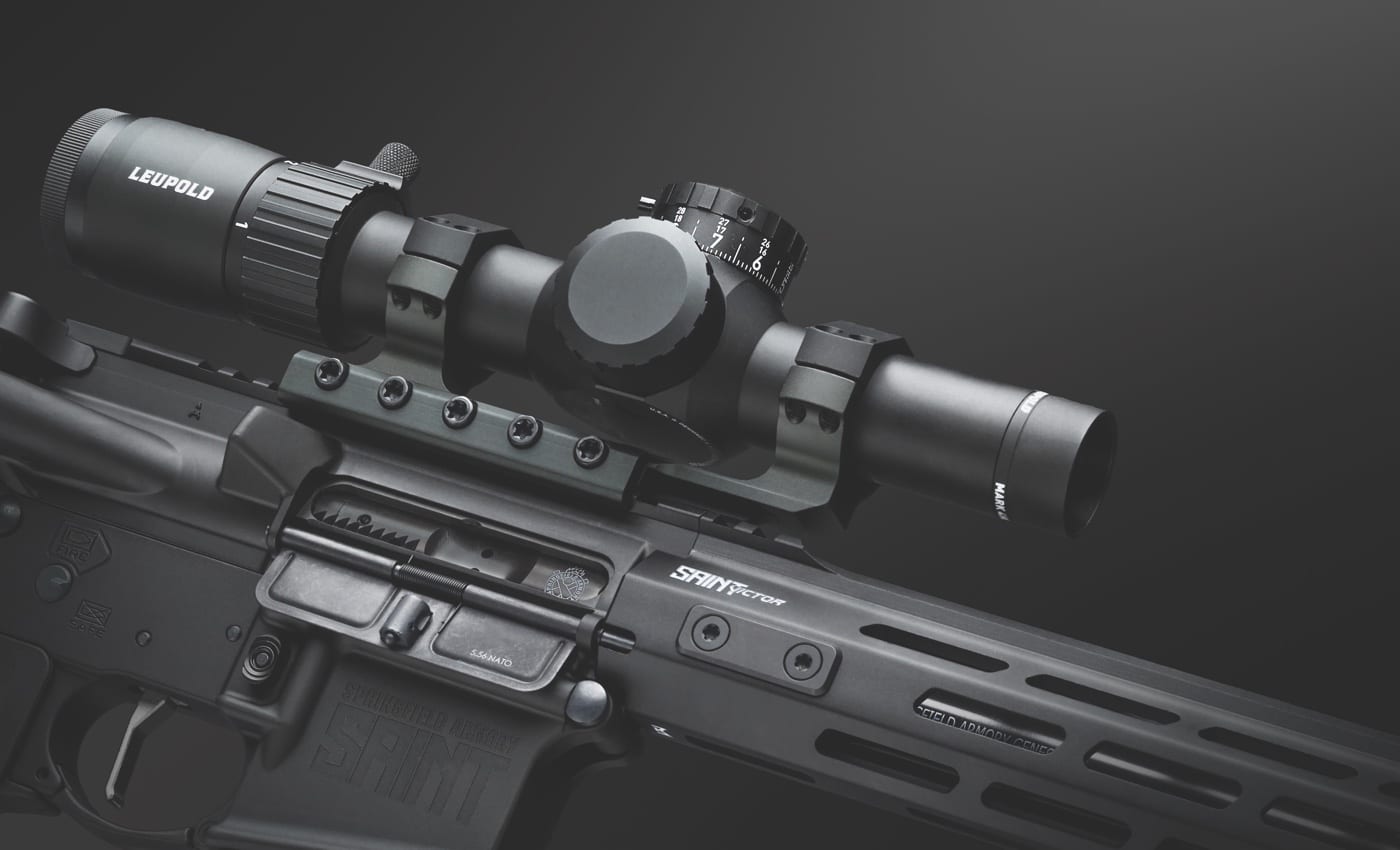
Finally, a 30mm main tube describes the diameter of the scope’s body, and this number is important for selecting the correct mounts and rings.
Within each of the scope configurations, Leupold also offers reticle options. These include first focal plane and second focal plane reticles, as well as a selection of both mil- and MOA-based reticles and adjustments. Both of those topics are subjects for standalone articles, but suffice it to say that Leupold is providing a thoughtful variety of options within the series.
LPVO Scope for the Win
There are a lot of great options within the Mark 4HD line — it is a comprehensive new series. One of the most appealing to me is the 1-4.5x24mm because it is the perfect pairing for a defensive carbine chambered for the .223 Remington/5.56x45mm NATO cartridges. The 1-4.5X Mark 4HD falls into a class of riflescopes often called low-power variable optics, or LPVOs for short. [Be sure to read What Is a LPVO Scope? for more information on these optics.]
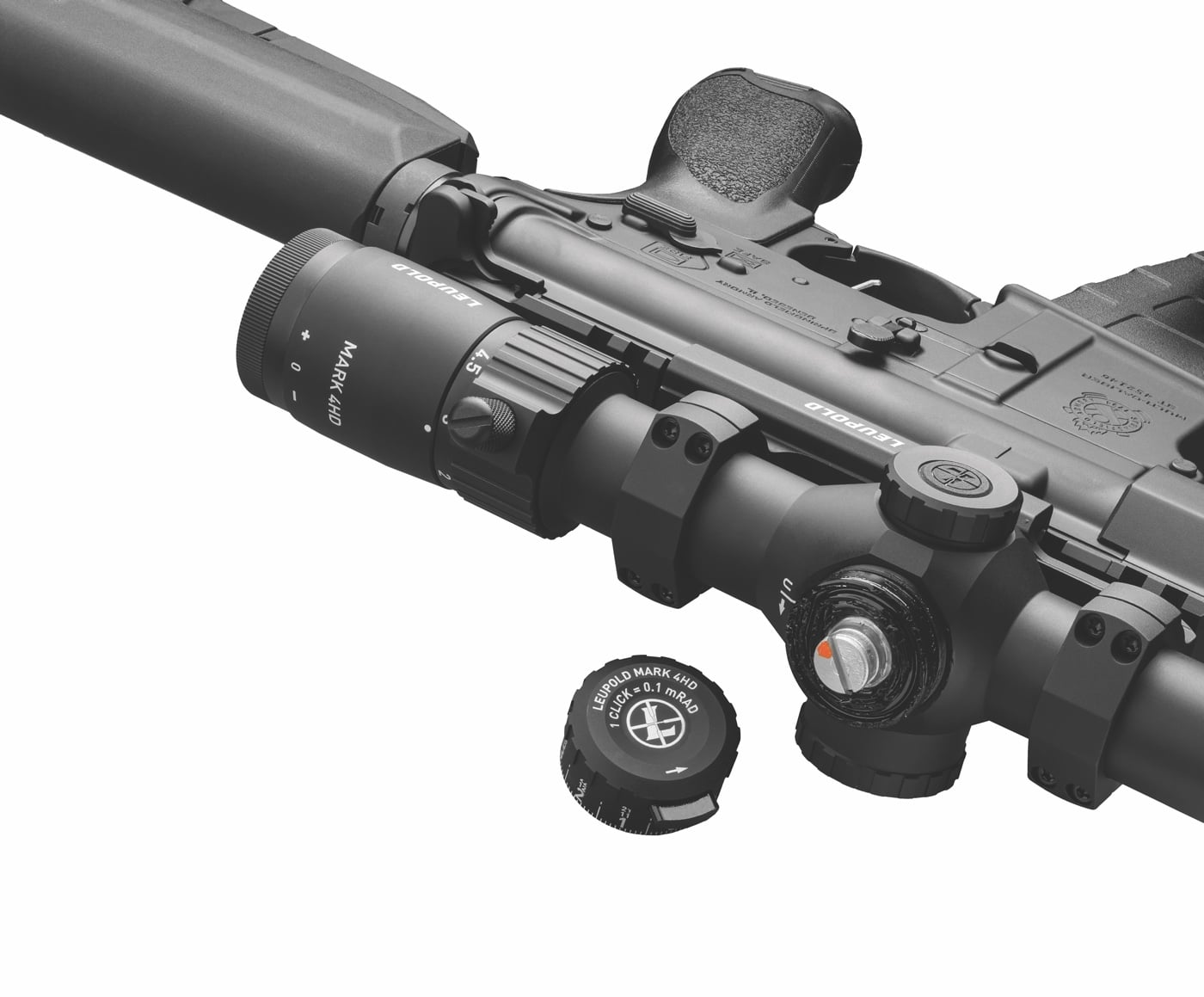
The best of these optics offer shooters dual utility as both a 1X reflex-style sight and a more powerful magnified optic capable of precision at greater distances. As well, the scopes in this category are generally light and trim, pairing well with the svelte dimensions of an AR-15-style rifle, and their magnification ranges are an ideal match to the ballistic capabilities of the 5.56 NATO cartridge. The 1-4.5X Mark 4HD exemplifies these characteristics and ups the ante by offering Leupold’s renowned durability and function.
In terms of size, the scope is 10.7” long, and utilizes a 30mm main tube and 24mm objective lens. Overall, it’s a sleek, low-profile design. Weight is fairly trim, too, at 18 oz., especially given the features Leupold packed into the little scope. The Mark 4HD is a true one-power optic, meaning no magnification at the lowest setting, so it can be used as a reflex sight when dialed down to 1X without any distortion that could disrupt both-eye-open shooting. Dialed up to 4.5X, the riflescope has plenty of magnification to match the performance of standard .223 Rem. and 5.56 NATO cartridges. Sure, these chamberings can be pushed to extended ranges, but most would agree they offer the greatest utility at 300 yards, and in.
The Mark 4HD’s magnification range also offers some familiarity for vets like me. For most of my time in uniform, my issued M4 was topped by a 4X fixed-power optic. I had no issues during qualification hitting E-type silhouette targets from 25 to 300 meters with this set-up. It was ideal for close-in environments because of its illuminated reticle and low-power magnification which offered a greater degree of precision but could still be utilized with both eyes open. I’m confident the Leupold would have performed with even greater alacrity given its enhanced and fully adjustable magnification.
Unlike the rest of the line, the 1-4.5X Mark 4HD is only available in SFP configurations. First focal plane systems tend to command and premium, and provide the most benefit in precision shooting, at extended ranges, and when used as range estimation tools. These tasks are not the primary domain of the LPVO. Fast shooting at close- and moderate-range targets are where LVPOs excel, and SFP reticles work perfectly in that role, while also keeping the overall price down.
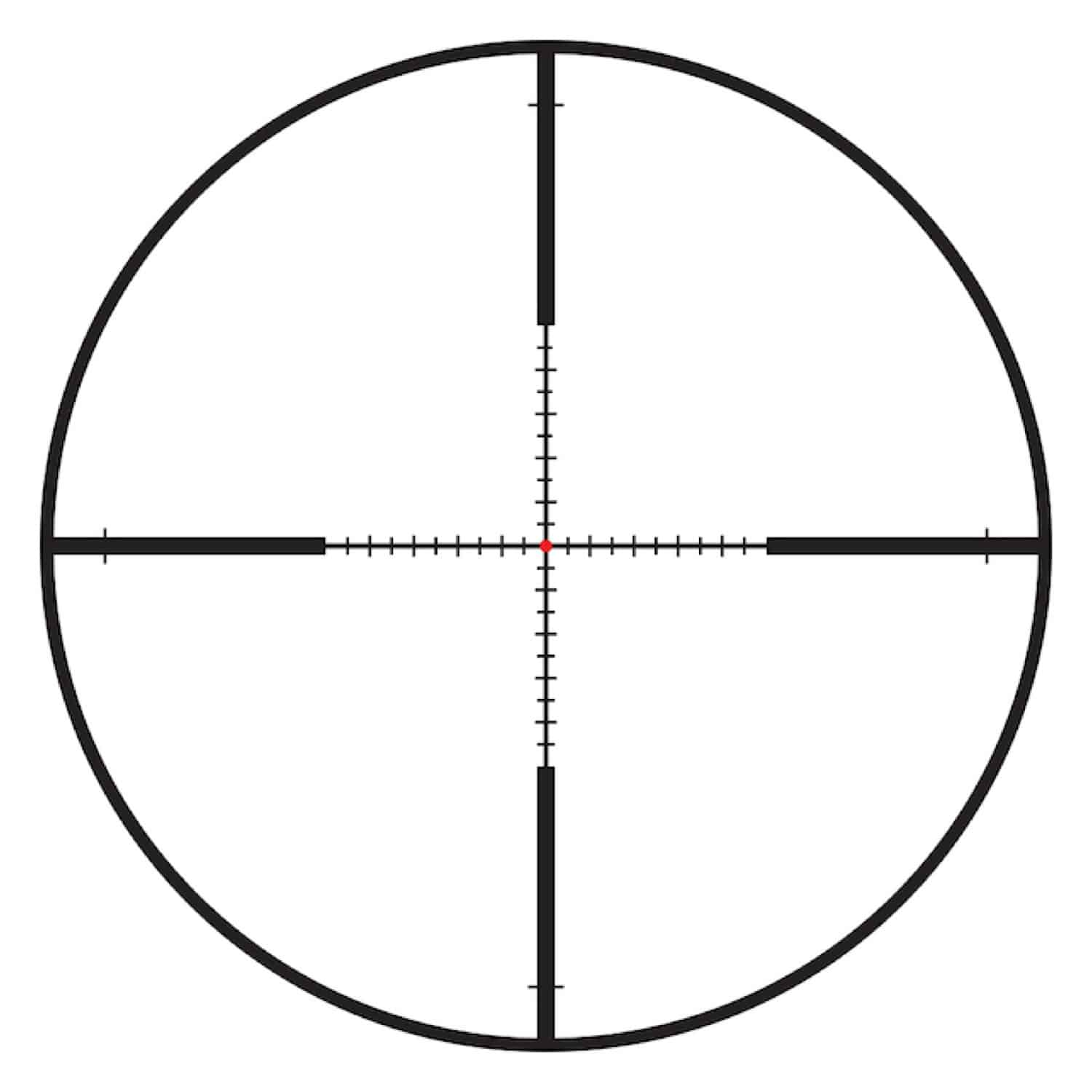
Three reticle options are offered for the 1-4.5x24mm scopes: FireDot TMR; FireDot BDC; and HPR-1. Both FireDot reticles use a CR2032 battery to power a red, illuminated central dot, and include a side-mounted push button to toggle between eight brightness settings. The Tactical Milling Reticle (TMR) is mil-based, and features hash marks on the horizontal and vertical stadia, both above and below the dot. A TMR-equipped scope also includes an exposed tactical/target-style elevation turret with zero-stop for dialing .1-mil-per-click adjustments. On the other hand, the FireDot BDC is an MOA-based scope, features capped turrets with ¼-MOA-per-click adjustments, and a conservative holdover reticle. Lastly, the HPR-1 uses a reflex-style circle-dot reticle design. It is not illuminated, but the scope does include an exposed zero-stop elevation turret for dialing ¼ MOA adjustments.
Leupold Mark 4HD 1-4.5×24 Scope Specifications
| Magnification | 1-4.5x |
| Reticle | SFP Illuminated FireDot TMR |
| Tube Diameter | 30mm |
| Adjustment Range | 48 mil for both windage and elevation |
| Weight | 18 oz |
| Length | 10.7″ |
| MSRP | $999.99 |
Field Test at the Shooting Range
For my evaluation, I used a Mark 4HD 1-4.5x24mm FireDot TMR scope mounted on a Springfield Armory SAINT Victor AR-15 Rifle in 5.56 NATO. The integral Picatinny rail on top of the rifle’s receiver provides the perfect attachment surface for Leupold’s Mark AR 30mm one-piece mount. The mount uses five cross-slot tightening bolts to secure the scope to the rail; when torqued to spec, the set-up is nearly bombproof.

Mounting the scope, I needed to remove the SAINT’s flip-up rear sight. I’m a belt and suspenders kind of guy when it comes to defensive firearms, so I like to have back-up irons if possible. In this situation, I ensured my iron sights were zeroed and marked the mounting locations before I removed them. I kept the dismounted sights with me in a small tool kit.
Zeroing the scope and rifle at 100 yards was simple, but I have two important takeaways for setting up Leupold optics with zero-stop elevation turrets. First, if your groups are printing high, don’t be surprised if the elevation turret bottoms out after just a few clicks. Don’t worry, simply remove the zero-stop cap and make your adjustments using the “naked” turret. The Mark 4HD 1-4.5x24mm offers 48 mils of both windage and elevation adjustment, so it’s unlikely to run out of room.
That brings me to the second takeaway: Use the zero-stop! Once the rifle and scope are zeroed, loosen and rotate (or re-install) the turret cap so that the number “0” is aligned with the zero-index line, and seat the cap downward until the zero-stop button engages. Done correctly, the system ensures easy return to zero by simply spinning the turret back until it stops. The zero-stop functionality also does a good job preventing inadvertent adjustments since the button needs to be depressed to leave zero.
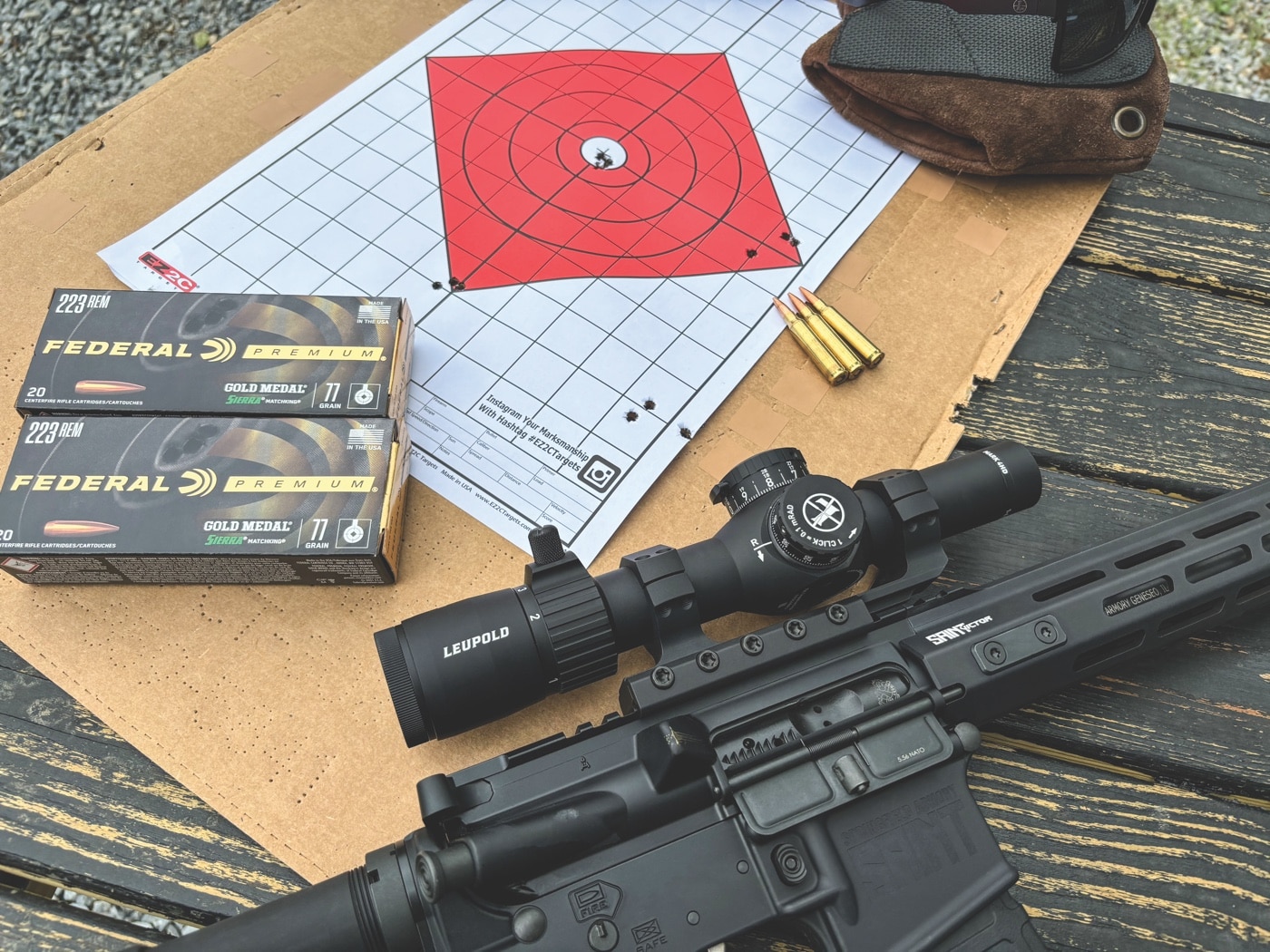
For testing, I wanted to validate the consistency and repeatability of the scope’s windage and elevation adjustments. To do this, I conducted a test often described as “shooting the square.” I’ve seen a few approaches, but my preferred method is to fire a total of 12 shots, adjusting between each shot. It looks like this: Fire — Dial Up — Fire — Dial Right — Fire — Dial Down — Fire — Dial Left; repeat the circuit three times. The key is to always keep the same point of aim and to use the same adjustment value between each shot. The end result should be four, three-shot groups spaced equally like the corners of a square.
To shoot my square, I set the target at 50 yards and opted to make 2.5-mil (25 clicks) adjustments between each shot — enough adjustment for clear results without sending shots off paper. For reference, one mil of adjustment is equivalent 10 cm, or about 3.6” at 100 yards, or 5 cm/1.8” at 50 yards. So, I was looking for about 12.5 cm/4.9 inches of separation between the square’s corners.
To eliminate some of the variance inherent to range-grade ammunition, I shot this exercise with Federal Premium Gold Metal Match ammo loaded with a 77-gr. Sierra MatchKing bullet. I knew from previous tests that this ammunition was capable of sub-MOA groups in the Saint Victor rifle. After three circuits around the square, the average separation between my groups was 4.8”, and my average group size was 0.67”. Given the human operator, sandbag rest, and 300 total clicks of adjustment, those numbers are pretty impressive!
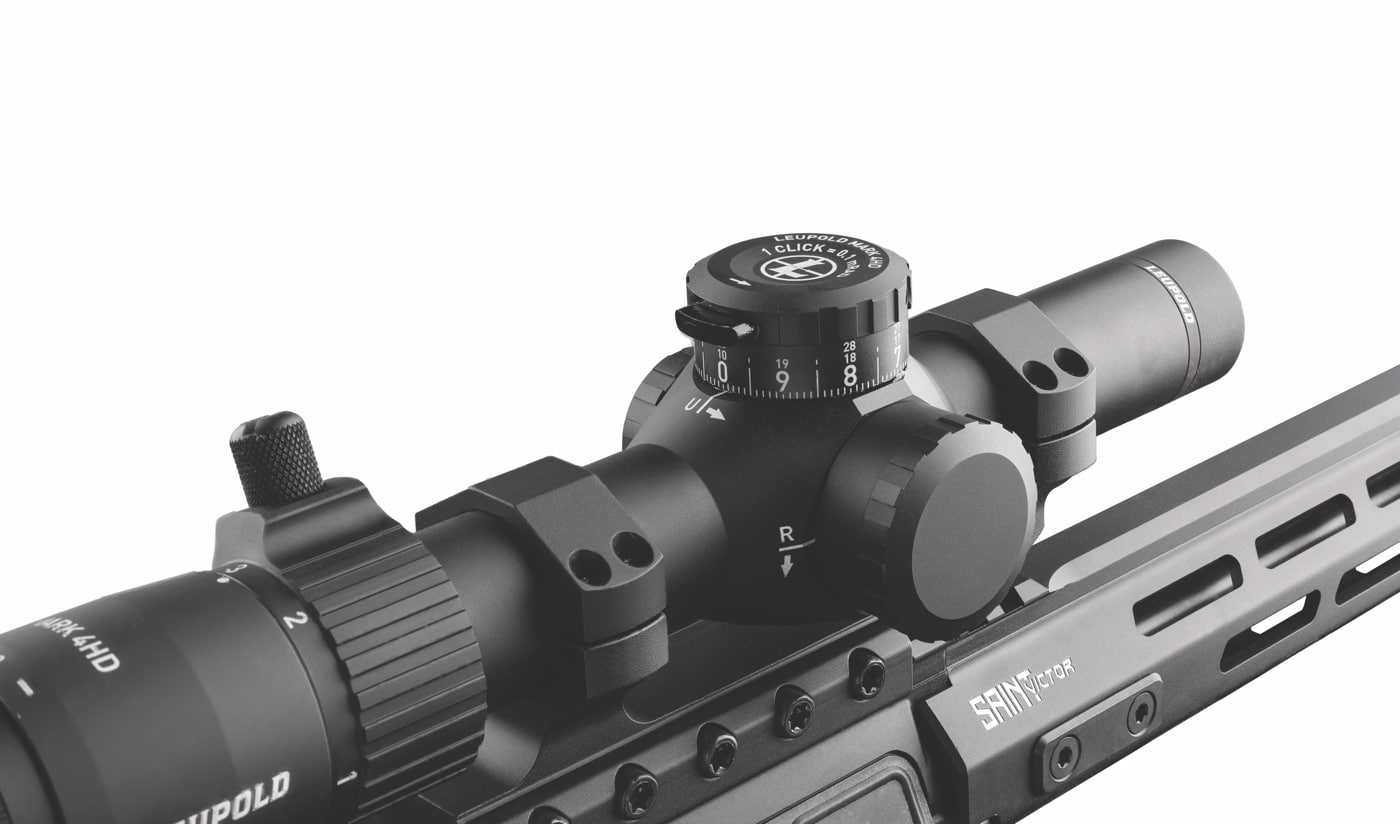
Having certified the performance of the scope, I wanted to test its utility as an LPVO by wringing it out on silhouette targets at various distances. I made up courses of fire on the fly to work transitions and provide opportunities to dial magnification up and back. I was impressed with how smoothly the zoom adjustment ring functioned. Speed was enhanced, even in gloved hands, by the ring’s grasping grooves and quick-turn lug, as well as the removable, low-profile knurled throw lever.
Finally, I highly recommend going with an illuminated reticle like the FireDot when possible. A 1X, the optic functions just like a red-dot reflex sight. At higher magnifications, the central illuminated dot provides a clear aiming point, even against dark-colored targets where a black crosshair alone may be hard to see.
Final Thoughts on the Mark 4HD Rifle Scope
The SAINT Victor in 5.56 paired with the Leupold Mark 4HD 1-4.5×24 is a handy and capable defensive option. The scope offers Leupold’s Professional Grade optical system, proven durability, precision adjustments, and duty-ready features and construction. And, with an MSRP of $999.99, the value is unmatched.
Editor’s Note: Please be sure to check out The Armory Life Forum, where you can comment about our daily articles, as well as just talk guns and gear. Click the “Go To Forum Thread” link below to jump in and discuss this article and much more!
Join the Discussion
Featured in this article
Read the full article here



